- Home
- Sherry Thomas
The Hidden Blade Page 4
The Hidden Blade Read online
Page 4
While the water heated, Amah rasped more instructions. Ying-ying located some dried flower buds on the bottom shelf. Tossed into the water, the buds gave out a clean, fresh scent, almost enough to mask the smell of regurgitated blood.
She was then directed to climb onto a chair and bring down a cloth bundle that had been concealed above the lintel. Inside were round balls the size of quail’s eggs wrapped individually in squares of silk, and a small porcelain jar. She unwrapped two balls, plopped them into the clay pot, and took the jar to Amah.
Amah struggled to pull her shirt up. A small package fell onto the kang. She ignored it and snatched Ying-ying’s palm to rest against her rib cage, below her left breast. “This is where you apply the salve.”
Ying-ying gasped—what she touched was cold as ice. She yanked back her hand, opened the jar of salve, and dug out a dollop.
“Warm it first,” Amah warned hoarsely.
Ying-ying kept the salve between her palms until it smelled faintly of leaves and bark. It began to sting her hands, making her palms prickle hotly. She smeared salve where Amah’s skin was unnaturally cold and kept her palm over Amah’s strange injury until Amah called for the brew.
When Ying-ying brought the bubbling potion, Amah drank it directly from the clay pot, stopping only to cool her tongue and gasp for air. When she had finished with the potion, she told Ying-ying to pull her shirt down and place the still-hot clay pot over where she had applied the salve.
“And put another pot on the stove. I must keep continuous heat over this.”
Ying-ying scampered around the tiny room, heating pots, ladling water to keep them from cracking, pouring water from one pot to the next, holding the hot pot on the right spot on Amah. She did this for what seemed like hours while Amah lay in a half faint, saying only, “Again,” and, “More.”
At last she said, “That’s enough. I’ll live.”
Ying-ying shuddered. She had been blindly, unthinkingly following directions, too busy and confused to consider that Amah might have been in mortal peril. She set aside the clay pot she had been holding, stretched her cramping arm, and let herself pant for a while.
The night outside was peacefully silent. The pursuit must have been called off—or taken to a different quarter of the city. Bao-shun was returning to his room, the bells on his sword tassel jingling faintly as he crossed the middle courtyard.
Amah snored lightly. Ying-ying stared at her curled-up form on the kang. How had Amah become injured? Where had she learned to leap off rooftops without breaking her ankles? And why was she the one being chased by the law, as if she were a dangerous criminal who needed to be apprehended?
Ying-ying pulled a bedspread over Amah. As she tucked in it around Amah’s person, her fingers came into contact with the package that had fallen from Amah’s shirt.
She took it to the stove where the fire still burned and lifted the stove lid for a bit more light. Inside the cloth was a small, thin panel of white jade, decorated with the image of a dancing goddess, the ribbons on her flowing robe floating all about her as if lifted by a gentle breath.
To the goddess’s left, the words, Emptiness is no other than form; form is no other than emptiness. And to her right, Form is exactly emptiness; emptiness exactly form. The famous Buddhist tenet, so well-known that even Ying-ying, who had never visited a monastery or studied a sutra, had heard of it.
A nice piece, the jade tablet, but to Ying-ying’s thinking not quite worth the trouble. It was too small and insubstantial, for one thing. And as pretty as white jade was, the material was not nearly as beautiful or valuable as kingfisher jade from Burma, which was as green as bamboo leaves in the shade.
“Give it back,” said Amah, startling her.
Ying-ying wrapped up the jade tablet again before placing it in Amah’s outstretched hand. “I thought you were asleep.”
“Maybe I was. But what do I keep telling you about digging into other people’s things?”
And the jade tablet, did you have to dig into other people’s things to get it?
But Ying-ying did not say it.
“Go back to bed,” Amah went on. “But before you leave, kneel and kowtow to me three times.”
“What?” Ying-ying couldn’t believe her ears. “Why?”
Amah’s demand was preposterous. Ying-ying liked Amah. She adored Amah. But Amah was a servant. One did not kowtow to servants. Three times? She kowtowed to Mother only three times a year, on New Year’s Day, Mother’s birthday, and her own birthday. Was Amah out of her mind? If anything, Ying-ying should be the one expecting a show of gratitude for all she had done to save Amah’s life. Why, her feet were completely chilled.
“To acknowledge me as your master.”
Ying-ying would have laughed out loud if she hadn’t been so stunned. “My master in what?”
“Your master in the Order of the Shadowless Goddesses.”
“What’s that?”
Amah sighed, a sound somewhere between bitterness and irony. “Three hundred years ago every child south of the Yangtze River knew of it. But now it will be just you and me.”
“I don’t want to join,” Ying-ying protested. “I don’t want a master to order me around.”
She was old enough to know that the word “master” was not bandied about lightly. She’d be bound to obey and serve Amah. The thought did not appeal to her at all. Their current arrangement, where she listened only when she wished, suited her much better.
Amah’s voice turned unforgiving. “You know my secret. Join or die.”
It was not a tone Ying-ying was used to from the woman who daily cajoled her to eat her vegetables and wash her face, who never had a harsher word for her than empty threats to inform her mother of some particular mischief.
“You can’t kill me!” she responded indignantly.
“No?” Amah chuckled softly.
Before Ying-ying knew what happened, she felt an icy stab in her chest. A rising scream never made it past her throat as Amah’s finger, like a snake rearing from the grass, jabbed her twice along her jawline.
Her mouth became soldered shut. She could not get her chin to drop nor her lips to part. Trembling, she looked down. A tiny, straight-bladed knife glinted dully in the nether light, its tip straining against her thin blouse.
She swallowed. There was no arguing with that.
Sensing her victory, Amah retracted her knife. It disappeared up her sleeve. She jabbed again at Ying-ying’s face and unlocked her jaw.
Unhappily, Ying-ying performed the three kowtows, but she did them most sloppily.
Amah only sighed. “Go now. I need to rest.”
Ying-ying got up without a word. As she stopped at the door to peer outside, Amah’s voice came again. “And if you must skulk about at night getting yourself into trouble, at least put on your slippers.”
Chapter 4
The Upending
Grouse season had begun, and every self-respecting gentleman must ready his firearms. Leighton sat before a large table, reassembling the components of his fowling piece that he had taken apart to clean and oil.
The house had actual antique guns: flintlock blunderbusses, Long Land Pattern muskets, carbines that had seen service during the French Revolutionary War. Compared to those, the fowling piece was quite new, commissioned for Father when he had been a boy.
Outside, leaves rustled and birds chirped. The breeze that came in from the window was warm—and sweet with the scent of grass and honeysuckle. The sky was a lovely blue, the color of Marland’s eyes.
Mother had taken Marland away again—Leighton missed him with a painful ferocity. Leighton’s tutor, Mr. Hamilton, was also away on holiday. The hours never passed. They were fat with heavy, immobile minutes, with seconds that emptied as slowly as an old lady’s glass of sherry.
He and Father took a turn on the downs every day, but without Herb’s easy camaraderie, those walks were largely silent, just a man with too much on his mind walking beside a boy he st
ill considered too young for the truly troubling matters of life.
The shotgun reassembled, Leighton set its stock against the pocket of his shoulder and pointed the barrel out the open window. He hoped words would come more easily when they were shooting grouse—Father was an excellent shot and took pride in Leighton’s marksmanship.
He pointed the muzzle up, and then slowly swept his aim lower. A man stood on the gravel drive at almost point-blank range.
“Is this how you greet an old friend, my dear boy?”
Herb! In the three months since Leighton had last seen him, he must have lost at least a stone in weight—his Adam’s apple protruded and there were hollows under his cheekbones—but his smile was as wide and brilliant as ever.
And then that smile wobbled and faded. “Will you not say hullo, Leighton?”
Leighton realized he was staring. He put down the shotgun, climbed over the window ledge, and leaped ten feet to the ground below. Herb had him in a tight embrace almost before he’d straightened from the landing.
“My dear boy,” Herb murmured. “My dear, dear boy.”
“You didn’t go off to India!” Leighton blurted out.
“Not without you, my dear boy. And not without your father.”
Leighton stood in his embrace for a little longer—all was right with the world again. Then he took Herb by the arm and they ran toward the front door. “Why didn’t you cable? We had no idea you were coming.”
They almost collided with Father, sprinting out of the house. There was a sheen of tears in Father’s eyes. When he shook Herb’s hand, he grasped the latter’s forearm too.
“I hoped you would come.” Father’s voice quavered with gratitude.
“You knew I would,” said Herb, “the second you sent word.”
They gazed at each other. It was only for a moment, but Leighton suddenly felt as if he ought to be elsewhere.
“Father, may I go do some shooting by myself?” he asked.
“Of course.” Father beamed. “Make sure you are back in time for dinner. Tonight we shall feast.”
Leighton strode away from the house—no one would notice that he didn’t have his firearm with him. And he didn’t want to shoot anything; he only wanted walk and run and savor this burst of brightness in his heart.
Which was followed by a gnawing fear: Did Father and Herb truly risk eternal condemnation?
He walked for a long time before the cloud in his heart dissipated: He knew nothing about eternity, but he was certain that if they could not be together, then they were condemned for this life.
He was glad that Father had asked Herb to return. He was glad that Herb would remain in their lives. And he would never be anything but glad and grateful that they were now a family again.
Leighton cocked the air rifle, aimed, exhaled, and pulled the trigger.
“Excellent,” came Herb’s voice behind him. “Bull’s-eye.”
“It’s all right,” said Leighton, though he was quite pleased with the shot. He was using an archery target that he had found in one of the outbuildings on the estate, and his pellet had struck dead center.
“No shooting today?”
“Doesn’t seem fair to disturb the grouse day after day.”
“You are as kind as your father,” said Herb, his eyes shining.
To grouse, maybe. To people, Leighton wasn’t so sure. He didn’t have Herb’s easy embrace of others, nor Father’s ready compassion.
"And you must have grown two inches since I last saw you,” Herb went on.
“Only three-quarters of an inch.”
His increase in height had been much remarked upon the past few weeks, especially on Sundays, after church. Usually the comments embarrassed him and made him feel like a puppy that had sprouted a second tail. But Herb’s observation was friendly and matter-0f-fact, reminding Leighton that he did rather relish becoming taller.
They began walking in the direction of the house—it was almost tea time.
“Do you know what I did this summer?” asked Herb. “I gave my jade tablet for appraisal.”
Decades ago, Herb’s father had brought back two nearly identical tablets from China—two out of the three clues to the location of the treasure, if one believed the legend. Herb had given one to Father and kept the other for himself.
“Were you going to sell it?” Leighton’s voice was more alarmed than he had meant for it to be.
“No, absolutely not! Before they were…Well, they were once my father’s engagement present to my mother. I was thinking of the British Museum.”
Leighton exhaled. “Oh, that’s all right, then.”
“That’s what I said to myself: It’s quite all right if it ended up in a temple of art and history, admired by millions. But before I could do that, I needed to make sure that it really was a valuable antique, and not just on my father’s say-so.”
“What did the appraiser say?”
“Ah, the appraiser. I’m sure I proved quite a trying client—he had to write me three times before I returned to speak to him. Two weeks ago I called on him at last, and he told me that he would put the tablet at about a thousand years old, dating from the middle of the ninth century.”
A true antique, then.
“And remember the legend about the treasure?” Herb went on.
“Did the appraiser know about it?”
“No, he didn’t. But when I mentioned it, he was able to provide some historical context. The persecution the Buddhist monks feared actually came to pass. After a tremendous flourishing of the religion earlier in the Tang Dynasty, there came an emperor who both hated foreign influences and needed his treasury replenished after a costly border war. Almost all the monasteries in China—nearly five thousand in number—were destroyed, their wealth seized, and hundreds of thousands of monks and nuns forced to return to lay life.”
Leighton stumbled a step—he wasn’t looking where he was going, but at Herb. “Are you sure?”
“I am faithfully repeating what the appraiser told me. According to him, the persecution didn’t last terribly long—the emperor was on the throne for only five or six years—but the damage was quite thorough. Buddhism in China never quite regained its former glory.”
And the legend, which Leighton had thought endlessly glamorous, was actually nothing of the kind, but a story of heartache, desperation, and unimaginable tyranny—the despotism of one man destroying the hopes and dreams of so many.
“Quite something, eh?” said Herb, looking at him.
“Yes, quite something,” answered Leighton, almost mechanically.
The monks of a millennium ago had been apprehensive. They might even have been afraid. But the wholesale annihilation of their entire way of life must have exceeded even their worst fears.
It could happen, the upending of life as one knew it.
It could happen anytime.
Leighton, however, did not expect the upending of their lives to take place only three days later.
They had gone for an excursion to the coast and camped overnight on a stretch of cliffs overhanging the sea. And in the morning they had risen early and picked their way down to the beach below to watch the sunrise.
“The world is such a beautiful place,” Herb said, his voice full of joy. “How fortunate we are to be here together.”
Leighton wanted the moment never to end, standing barefoot on the beach with his father’s hand on his shoulder, the murmur of the sea in his ears, and the majestic curvature of the sun breaching a horizon that was all scarlet and gold.
In the first light of this wonderful day, they rebuilt the fire from the previous night and roasted sausages for breakfast. Afterward they held a footrace on the beach, swam, and dug rather incompetently for clams. They returned to Starling Manor in time for a slightly late luncheon, after which Father and Herb both pleaded fatigue and retired to their rooms for an afternoon nap.
Leighton, not given to naps, climbed up the big oak on the far side of the trout
stream. Where the main trunk divided into a dozen branches, there was a depression that made for a decent seat. On warm summer days he liked to read there, under the shade of the boughs.
The book he brought was Voyage au Centre de la Terre—an English translation was available, but Leighton wanted to read in the original French, and Herb had obliged. Leighton did not entirely believe the book’s premise—a vast ocean many miles under the surface of the earth? Hadn’t he read somewhere that it became hotter and hotter as one descended? That subterranean ocean would boil the ichthyosaurus and plesiosaurus that supposedly swam in its waters. All the same, the story was fast-moving and enjoyable, and he stopped reading only when he realized he had forgotten to bring a canteen and had become quite thirsty.
As he approached the house, he saw a fair-haired woman handed into a waiting carriage by a man. The man nodded as the carriage drove off.
Recognition came like a kick in the kidney. The man was Sir Curtis.
Leighton sprinted for the service entrance. Mr. Mims the butler would put Sir Curtis in the drawing room and serve him tea and biscuits. And while Sir Curtis waited, Leighton could run up unseen from the service stairs and warn Father and Herb.
But when he reached Father’s apartment the door was wide-open. Father’s bed was all smooth counterpane and perfectly fluffed pillows. No one had napped in it—no one had even put a hand on the bedspread.
And then Leighton saw the fireplace, one end of which was now a foot and a half from the wall. He didn’t know about this particular hidden passage, except to instinctively grasp that the last person who had passed through could not have been Father, who would not leave such a secret out for everyone to see.
That was when he remembered that both Father and his estate had been under Sir Curtis’s guardianship for some years. Sir Curtis could very well know the house as well as anyone did—and the idea filled Leighton with anxiety.

_preview.jpg) Claiming the Duchess (Fitzhugh Trilogy Book 0.5)
Claiming the Duchess (Fitzhugh Trilogy Book 0.5) The Art of Theft
The Art of Theft The Magnolia Sword: A Ballad of Mulan
The Magnolia Sword: A Ballad of Mulan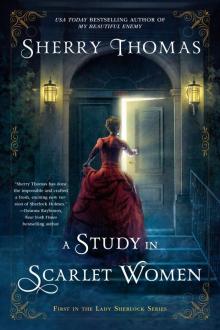 A Study In Scarlet Women
A Study In Scarlet Women The Hollow of Fear
The Hollow of Fear The Magnolia Sword
The Magnolia Sword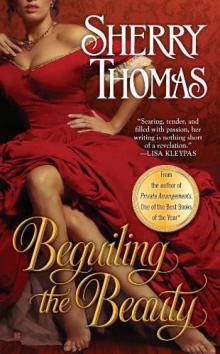 Beguiling the Beauty ft-1
Beguiling the Beauty ft-1 The Heart is a Universe
The Heart is a Universe The Hidden Blade: A Prequel to My Beautiful Enemy (Heart of Blade)
The Hidden Blade: A Prequel to My Beautiful Enemy (Heart of Blade)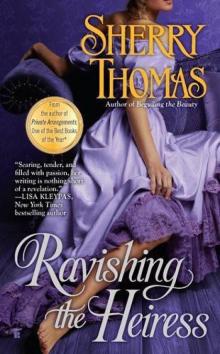 Ravishing the Heiress ft-2
Ravishing the Heiress ft-2 The Immortal Heights
The Immortal Heights The Hidden Blade
The Hidden Blade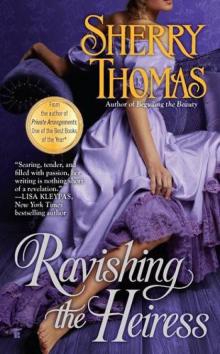 Ravishing the Heiress
Ravishing the Heiress Tempting the Bride
Tempting the Bride The Luckiest Lady in London
The Luckiest Lady in London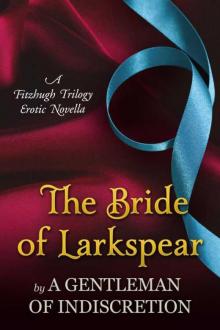 The Bride of Larkspear: A Fitzhugh Trilogy Erotic Novella
The Bride of Larkspear: A Fitzhugh Trilogy Erotic Novella Claiming the Duchess
Claiming the Duchess The One in My Heart
The One in My Heart His At Night
His At Night A Dance in Moonlight
A Dance in Moonlight A Conspiracy in Belgravia
A Conspiracy in Belgravia Not Quite a Husband
Not Quite a Husband